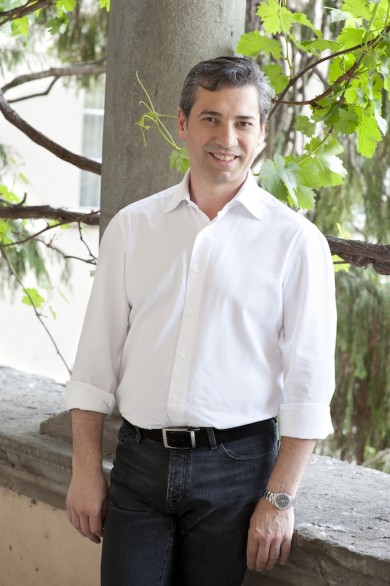Upshaw, Luisotti deliver taut, compelling performances with Cleveland Orchestra

Dawn Upshaw performed Golijov's "Three Songs" Friday night with the Cleveland Orchestra at the Arsht Center. Photo: Dario Acosta
For the middle program of its 2012 residency, the Cleveland Orchestra delivered a taut, compelling performance Friday night at the Arsht Center, which continued to mark a strong improvement over its last year’s sleepy Miami season.
Leading the ensemble as guest conductor was Nicola Luisotti, music director of the San Francisco Opera, and his idiosyncratic style and almost-authoritarian mastery of the orchestra brought an unusual excitement to the concert. The program itself represented a vast improvement over last season’s selection of overplayed classics, with a great 20th century symphony and a set of vocal works by one of the world’s most popular living composers.
The soprano Dawn Upshaw joined the orchestra for Osvaldo Golijov’s Three Songs for Soprano and Orchestra. Upshaw, who has worked closely with the Argentine composer, has made something of a specialty of these songs, composed from 1999 to 2001 as separate works but assembled by the composer into a cycle in which they’re usually performed today.
The songs are highly accessible—almost excessively so, and you wonder how much they will stick to the ribs after repeated hearings. But they make the most of Upshaw’s luminous voice and vocal range, and this sensual, tactile, evocative music invites the listener to just bask in the warmth of her voice and the rich sounds of the orchestra.
The first song, Night of the Flying Horses, is a Yiddish lullaby with a distinctly eastern European tone but without a trace of ethnic kitsch. It opened with Upshaw singing without accompaniment but with dead-on intonation, vocal warmth and expressive, almost free-form phrasing. Particularly notable was a long dark tutti that ended the work, with sonorous rumblings in the lower strings and sudden burst of Golijov’s tango-like electricity in the violins.
In Lúa Descolorida, sung in the Gallego language of the Galicia region of Spain, Upshaw revealed the vulnerable side of her vocal personality, singing softly and with great emotional expressiveness in the woman’s sad nighttime lament to the moon. The strongest song was the last, How Slow the Wind, set to lines of Emily Dickinson, a pulsing, finely paced work in which Upshaw sang in a yearning manner that drew on the smoky lower register of her voice.

Nicola Luisotti. Photo: Marco Rossi
In Prokofiev’s Fifth Symphony, Luisotti drew from the orchestra a performance of great nervous tension and ensemble precision. The first movement opened at a slow pace and Luisotti calibrated the volumes with great care, yielding a climax of shattering power. The bouncy second movement can come off as raucous and chaotic in the wrong hands, but Luisotti drew the bow as tight as possible while allowing for wild bursts of energy. Strings played in biting and strongly marked manner, with an almost violent performance of the opening theme. At a couple of points Luisotti stopped conducting, holding his arms out as if to give the orchestra he had kept under such tight restraint a sudden rush of freedom. The quiet brass choir passage toward the end of the movement was particularly compelling, full of ominous energy that suddenly opened up as the full orchestra returned to the opening them.
The brooding third movement was taken with a surprising coolness that gave it an ominous quality, allowing the pulsing repeated figures in the strings to achieve the effect with closely calibrated dynamics. The final movement built slowly and thanks to Luisotti’s control of the orchestra and the ensemble’s unity of attack, built to an explosive climax.
The concert opened with the Triumphal March and Ballet Music from Verdi’s Aïda. Performed with a full-sized symphony orchestra rather than the medium-sized ensemble that accompany operas, Verdi’s big, assertive music acquired unusual weight. Particularly impressive were the brass players, whose brought an unaccustomed brilliance and finesse to the work without a trace of raucousness or rawness.
The Cleveland Orchestra repeats the program 8 p.m. Saturday at the Arsht Center for the Performing Arts. arshtcenter.org, 305-949-6722
Posted in Performances
6 Responses to “Upshaw, Luisotti deliver taut, compelling performances with Cleveland Orchestra”
Leave a Comment
Sat Mar 3, 2012
at 2:53 pm
6 Comments
Posted Mar 05, 2012 at 12:54 pm by Robert Wolfson
Re your review of Cleveland: Disagree. The feelings in the hall after Ms. Upshaw sang was palpable. A number of people in the audience were touched enough to call tears to their eyes.
Unfortunately the choice of the triumphalism of Prokofiev, the dissonance and the prancing of the conducter destroyed a memorable experience. Surely tthere were better choices.
Thanks for letting me vent
Posted Mar 05, 2012 at 4:23 pm by Lois Model Rukeyser
We attened the fri. night concert — we loved the conductor & the oschestra but did not hear Ms. Upshaw well — acustics not perfected. We had great seats dead center.– first tier, we should have been able to hear her well.
Posted Mar 05, 2012 at 4:41 pm by Edward Mast
All three works were thrilling. Dawn Upshaw sang beautifully and expressively, and the orchestra played magnificently. Nicola Luisotti seemed totally in command of the music and his conducting style was clear and eloquent.
Posted Mar 05, 2012 at 5:28 pm by Chantal F Martell
Thankyou fo putting my thoughts into words. Brought my2 children 13 and 12, nd we all enjoyed it. We also noticed the conductor’s tight performance, and at times totaly loose (during Aida also).
Posted Mar 05, 2012 at 8:43 pm by Ignacio Martínez-Ybor
One has to note with much displeasure the ridiculous programming of the Triumphal March and Ballet Music from Aïda. This is not the Boston Pops. It is a waste of opportunity to hear the Cleveland Orchestra in more interesting music, commensurate with the prices we pay and with what the Cleveland can deliver. In addition, this is music that sounds incomplete without the chorus, notwithstanding how robust the orchestra may sound. The Verdi selection should not have been programmed. But if it had to be Verdi, an overture, for example, that to I Vespri Siciliani would have been meatier music. But it didn’t have to be Verdi, and it didn’t have to be the trite “other” graduation march (Pomp&Circumstance perhaps being grads’first choice).
The Golijov songs and the Prokofiev redeemed the program. Mr. Wolfson is not alone in noticing the prancing and ridiculous posing by the conductor. It was almost out of a silent movie, and totally unnecessary.
Posted Mar 06, 2012 at 2:38 am by Enrique Sanchez
The Second Concert was a delight from start to finish! The Prokofiev 5th, is one of my very favorite pieces. I studied it in detail as an amateur composer and delighted in all of the stupendous sounds that the Cleveland produced.
As for the selections, I would have to disagree with another poster. They were gloriously contrasting and quite enjoyable.
Ms Upshaw’s voice sounded beautifully up to the last rows, where we were seated that night. Albeit – her limits were reached in certain spots – but oh heck…she was wonderful and the Golijov songs were a treasure to behold. I can’t wait for the final concert!